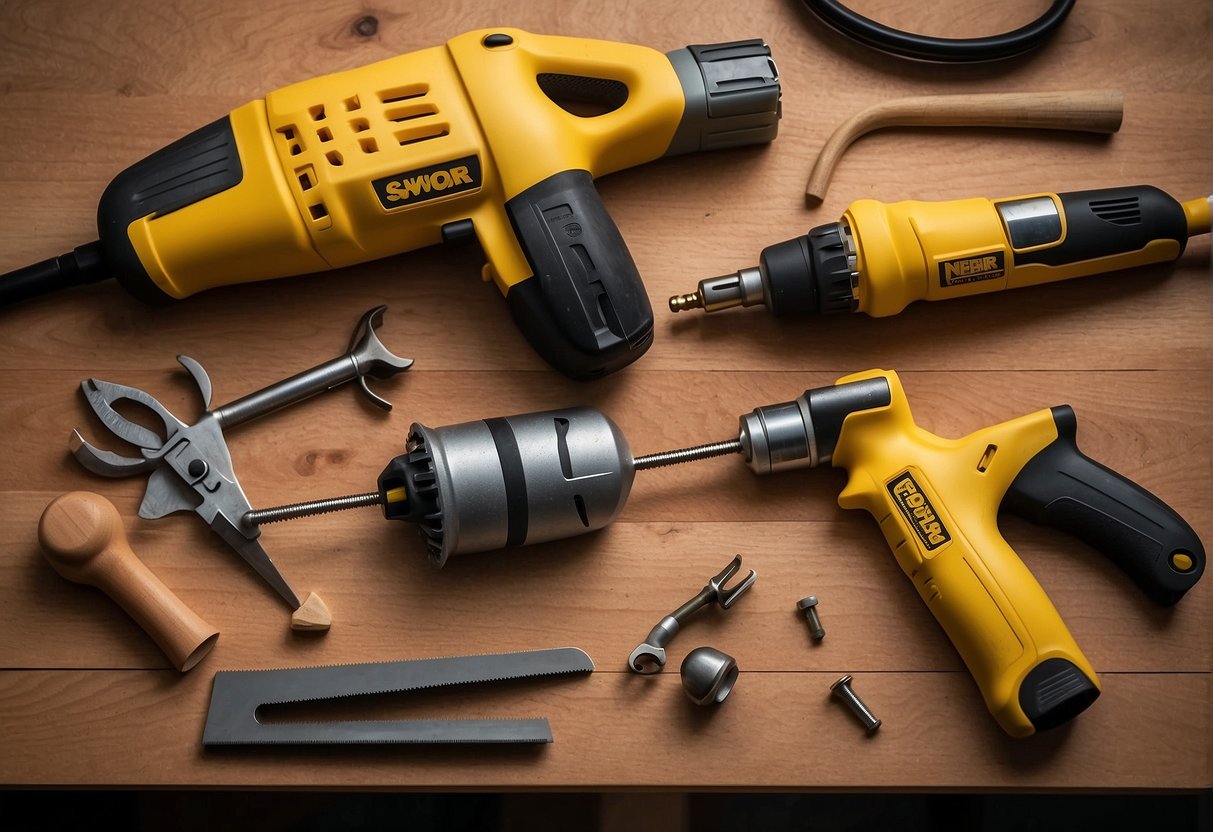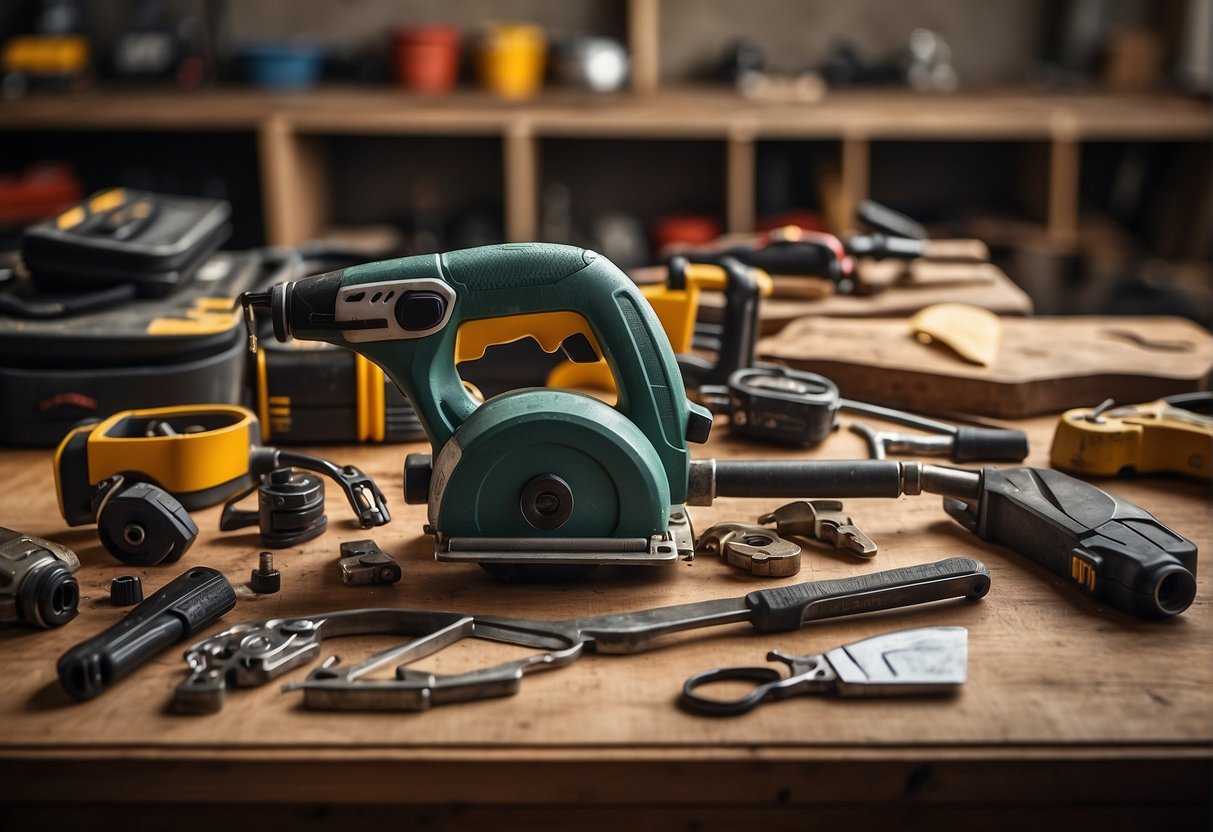When it comes to tools, there are two main categories: power tools and hand tools. Both types have their advantages and limitations, and it’s important to choose the right tool for the job. In this article, I will compare power tools and hand tools, and discuss when to use each type of tool.
Power tools are tools that use electricity, batteries, or compressed air to perform tasks. They are generally faster and more efficient than hand tools, and can handle larger and more complex projects. However, power tools can be expensive, require maintenance, and may not be suitable for all projects.
Hand tools, on the other hand, are tools that rely on manual labor to perform tasks. They are generally less expensive than power tools, require little maintenance, and can be used for a wide range of projects. However, hand tools can be slower and less efficient than power tools, and may not be suitable for larger or more complex projects.
Comparing Power and Hand Tools
When it comes to choosing between power tools and hand tools, there are a number of factors to consider. In this section, I will be comparing power and hand tools in terms of control and precision, speed and efficiency, and safety considerations.
Control and Precision
Hand tools are often preferred for tasks that require a high level of control and precision. For example, hand saws are often used for intricate woodworking tasks, while hand drills are ideal for creating small holes. With hand tools, you have complete control over the tool, which allows you to make precise cuts and adjustments.
Power tools, on the other hand, are often preferred for tasks that require speed and power. For example, power saws are ideal for cutting through thick pieces of wood or metal quickly and efficiently. However, power tools can be more difficult to control than hand tools, which can make them less suitable for intricate tasks that require a high level of precision.
Speed and Efficiency
One of the main advantages of power tools is their speed and efficiency. With a power tool, you can complete tasks much more quickly than you could with a hand tool. For example, a power drill can quickly create multiple holes in a piece of wood, while a hand drill would take much longer to complete the same task.
However, it is worth noting that power tools can also be more expensive than hand tools, and they require a power source to operate. This means that they may not be the best choice for tasks that require a lot of mobility or that need to be completed in remote locations.
Safety Considerations
When it comes to safety, both power and hand tools have their advantages and disadvantages. Hand tools are generally considered to be safer than power tools because they are less powerful and easier to control. However, hand tools can still be dangerous if they are not used correctly, and they can cause serious injuries if they are not handled properly.
Power tools, on the other hand, can be more dangerous than hand tools because they are more powerful and can cause serious injuries if they are not used correctly. However, modern power tools are designed with safety features that help to minimize the risk of injury, such as safety guards and automatic shut-off switches.
In conclusion, both power and hand tools have their advantages and disadvantages, and the best choice will depend on the specific task at hand. When choosing between power and hand tools, it is important to consider factors such as control, precision, speed, efficiency, and safety.
Power Tools: Advantages and Limitations
As a handyman, I have used both power tools and hand tools for various projects. Power tools have their advantages and limitations, and it is important to consider them when deciding which tool to use for a specific task.
Electricity and Battery Usage
One of the main advantages of power tools is that they are powered by electricity or batteries, which provides a consistent and reliable source of energy. This allows for greater precision and speed when using power tools compared to hand tools. However, the downside is that power tools require a power source, which may not always be available, and they can be more expensive to operate due to electricity or battery usage.
Maintenance and Durability
Power tools require regular maintenance to ensure they are working correctly and safely. This includes checking the power cords, blades, and other parts for damage or wear. Additionally, power tools can be more expensive to repair or replace compared to hand tools. However, power tools are generally more durable and long-lasting than hand tools, which can save money in the long run.
Specific Power Tools and Their Uses
There are many types of power tools available, each with their own specific uses and advantages. For example, a circular saw is great for making straight cuts in wood or metal, while a drill is essential for drilling holes or driving screws. A sander is useful for smoothing out rough surfaces, and a nail gun can quickly and easily attach nails to a surface. A table saw is ideal for cutting large pieces of wood or other materials.
In conclusion, power tools have their advantages and limitations, and it is important to consider them when deciding which tool to use for a specific task. While power tools can be more expensive and require regular maintenance, they offer greater precision and speed compared to hand tools. Additionally, there are many different types of power tools available, each with their own specific uses and advantages.
Hand Tools: Benefits and Drawbacks
As a DIY enthusiast, I have always appreciated the value of hand tools. They are simple, affordable, and versatile tools that can be used for various projects. However, they also have their drawbacks. In this section, I will explore the benefits and drawbacks of hand tools.
Cost-Effectiveness and Value
One of the main benefits of hand tools is their cost-effectiveness. Compared to power tools, hand tools are much more affordable and require less maintenance. They are also more durable and can last for years if properly taken care of. This makes them a great investment for DIY enthusiasts who are looking for tools that offer value for money.
Manual Effort and Physical Demand
One of the drawbacks of hand tools is the manual effort and physical demand required to use them. Unlike power tools, hand tools require physical effort to operate. This can be tiring and time-consuming, especially for projects that require a lot of cutting, drilling, or hammering. However, this physical effort can also be seen as a benefit for those who want to get a workout while working on their projects.
Types of Hand Tools for Various Projects
Hand tools come in various types and sizes, each designed for a specific task. For example, a hammer is used for driving nails, a screwdriver is used for tightening or loosening screws, and a handsaw is used for cutting wood. Each of these tools requires a different level of skill and physical effort to use effectively. Therefore, it is important to choose the right tool for the job to avoid damaging the tool or the project.
In conclusion, hand tools offer several benefits and drawbacks. They are cost-effective, durable, and versatile, but they also require manual effort and physical demand to use effectively. When choosing hand tools, it is important to consider the type of project and the level of skill required to use the tool effectively.
Project Considerations: When to Use Which
As someone who has worked with both power tools and hand tools, I know that choosing the right tool for the job is crucial to getting the project done right. Here are some project considerations to keep in mind when deciding whether to use power tools or hand tools.
Woodworking and Furniture Making
When it comes to woodworking and furniture making, hand tools are often the preferred choice. Hand tools allow for greater precision and control, making it easier to create intricate designs and details. Hand tools are also quieter and produce less dust, which is important when working with delicate materials like wood. However, power tools can be useful for larger projects or when you need to work quickly.
Construction and Heavy-Duty Tasks
For heavy-duty tasks like construction, power tools are often the way to go. Power tools can make quick work of tough materials like concrete and metal, and they can save you a lot of time and effort. However, hand tools can still be useful for certain tasks, like finishing work or detail work that requires greater precision.
DIY Projects and Home Maintenance
For DIY projects and home maintenance tasks, both power tools and hand tools can be useful. Hand tools are often more versatile and can be used for a wider range of tasks, while power tools can make certain tasks faster and easier. When deciding which to use, consider the specific task at hand and your own skill level. If you’re not comfortable using power tools, stick with hand tools until you gain more experience.
Overall, the decision to use power tools or hand tools will depend on a variety of factors, including the specific project, your own skill level, and your personal preferences. By considering these factors and choosing the right tool for the job, you can ensure that your project turns out just the way you want it to.
Making the Choice: Factors to Consider
When deciding between power tools and hand tools, there are several factors to consider. Each type of tool has its own strengths and weaknesses, and the choice ultimately depends on the project at hand and personal preference.
Budget
One of the main factors to consider is budget. Hand tools are generally more affordable than power tools, making them an excellent option for those on a tight budget. Building up a collection of hand tools can be done at a fraction of the cost required for assembling an equivalent set of power tools.
Power Source
Another important factor to consider is the power source. Power tools require a source of power, such as electricity or a battery, while hand tools rely on human power to operate. If you are working in a location without access to power, hand tools may be the better option.
Projects
The nature of your project is also an important consideration. For example, power tools are generally better for cutting through thicker materials, while hand tools are better for more intricate work. Consider the type of project you will be working on and choose the tool that is best suited for the job.
Cutting
If cutting is a major part of your project, power tools may be the better option. They are generally faster and more efficient at cutting through materials than hand tools. However, hand tools may be more precise, making them a better option for intricate cuts.
Safety
Safety is always an important consideration when working with tools. Power tools can be more dangerous than hand tools, as they are more powerful and can cause serious injury if not used properly. Always follow safety guidelines and wear appropriate protective gear when using power tools.
Costs
In addition to the initial cost of purchasing the tools, it is important to consider ongoing costs. Power tools may require replacement parts or batteries, while hand tools generally do not. Consider the long-term costs of owning and maintaining each type of tool before making a decision.
Strengths and Weaknesses
Each type of tool has its own strengths and weaknesses. Power tools are generally faster and more efficient, while hand tools may be more precise and easier to use in tight spaces. Consider the strengths and weaknesses of each type of tool and choose the one that is best suited for the job.
Benefits
Finally, consider the benefits of each type of tool. Power tools can make quick work of large projects, while hand tools may be better for more intricate work. Consider the benefits of each type of tool and choose the one that is best suited for your needs.
Frequently Asked Questions
What are the primary uses of hand tools compared to power tools?
Hand tools are generally used for tasks that require precision and control, such as woodworking, carving, and finishing. They are also useful for tasks that require a more delicate touch, such as handling small parts or materials. Power tools, on the other hand, are typically used for tasks that require speed and efficiency, such as cutting, drilling, and sanding.
What are the advantages and disadvantages of using power tools over hand tools?
Power tools offer several advantages over hand tools, including increased speed, efficiency, and power. They also tend to be more versatile, allowing you to perform a wider range of tasks with a single tool. However, power tools can be more expensive than hand tools, and they require a power source, which can limit their portability. Additionally, power tools can be more dangerous than hand tools if not used properly.
In terms of cost, how do power tools compare to hand tools?
Generally speaking, power tools are more expensive than hand tools. However, this can vary depending on the type and quality of the tool. For example, a high-end hand tool may cost more than a basic power tool. Additionally, power tools require a power source, which can add to their overall cost.
How do the functionalities of hand tools differ from those of power tools in woodworking?
Hand tools are typically used for more precise and detailed work in woodworking, such as carving, shaping, and finishing. Power tools are more commonly used for tasks that require speed and efficiency, such as cutting, drilling, and sanding. However, both types of tools have their place in woodworking, and many woodworkers use a combination of hand and power tools to achieve the desired results.
Can you list some examples of when it’s better to use hand tools instead of power tools?
Hand tools are often better suited for tasks that require precision, control, and a delicate touch. For example, hand saws are better for cutting intricate shapes and curves, while chisels are better for carving and shaping wood. Hand tools are also useful for tasks that require a more personal touch, such as finishing and polishing.
What are the safety considerations when choosing between hand tools and power tools?
When choosing between hand tools and power tools, safety should always be a top priority. Power tools can be more dangerous than hand tools if not used properly, so it’s important to follow all safety guidelines and instructions. This includes wearing appropriate safety gear, such as goggles and gloves, and using tools that are in good condition. Hand tools can also be dangerous if not used properly, so it’s important to use them with care and attention to detail.

Hi, I’m Sal Muller of Tooltrip.com. My DIY experience led me to understand essential power tools for home projects. Tooltrip.com guides enthusiasts and professionals in choosing right tools for any job. I provide concise top tool reviews for easier, efficient DIY.




